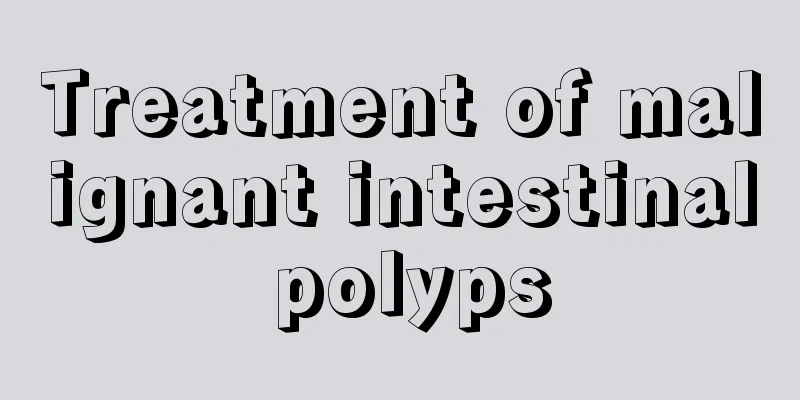Treatment of malignant intestinal polyps

|
Intestinal polyps are a relatively common disease. They can develop from benign to malignant. Almost all diseases have the risk of worsening. Therefore, if your intestinal polyps have developed into malignant ones, you must pay attention to it and receive effective treatment as soon as possible, otherwise it will bring great danger to our body. Next, we will introduce to you in detail some treatment methods for malignant intestinal polyps. Any growth on the large intestinal mucosa that protrudes into the intestinal cavity, regardless of its size, shape and histological type, is clinically referred to as "polyp" or "multiple polyps", also known as "polyposis". It belongs to the category of tumors, some of which are carcinoids; it is between benign tumors and malignant tumors [cancer]. Pathological examination can be divided into tubular adenomas, villous adenomas and tubulovillous (mixed) adenomas, adenomatous polyps (including papillary adenomas) are the most common, inflammatory polyps, the result of hyperplasia of intestinal mucosa due to long-term inflammatory stimulation, hamartoma polyps, and others, such as mucosal hyperplasia to form hyperplastic polyps, lymphoid tissue hyperplasia, carcinoid and other diseases. Clinically, polyps can be single or multiple, with colorectal polyps being more common and having more obvious symptoms. 1. Minimally invasive treatment (endoscopy) Polyps that meet the indications for endoscopic treatment can be removed endoscopically, and the resected specimens can be sent for pathological examination. 2. Surgery The polyp has a tendency to become malignant or does not meet the indications for endoscopic treatment; or pathological findings after endoscopic resection show residual lesions or cancer. 3. Medication (1) Symptomatic treatment: If bleeding occurs, stop the bleeding and take appropriate measures according to the amount of bleeding. (2) Etiological treatment For inflammatory polyps caused by ulcerative colitis, see Treatment of ulcerative colitis. (3) Prevention and treatment of familial adenomatous polyposis (FAP) patients can take celecoxib to reduce the number of adenomatous colorectal polyps, twice a day, with food. The above contents are about some treatment methods for malignant intestinal polyps. For normal people, if symptoms of intestinal polyps appear, do not delay and receive treatment as soon as possible. If you receive treatment early, the chance of recovery is very high and it will not cause great harm to the patient. Intestinal polyps are a disease that needs to be taken seriously. |
<<: Causes of blood clots during menstruation
>>: What is the best childbearing age for women?
Recommend
What should I do if my breasts are sagging at the age of 22?
Nowadays, more and more people are experiencing s...
Be alert if your child suddenly loves biting his nails! 8 dangerous behaviors that may indicate psychological problems in children
"Mom, my fingers hurt!" When the child ...
Why is there yellow gelatin in donkey-hide gelatin cake? Should donkey-hide gelatin be soaked in boiling water or warm water?
Donkey hide gelatin cake tastes good and has cert...
Does your child sneeze frequently? It may be allergic rhinitis!
Author: Zhao Jing, Chief Physician, Children'...
Can brown sugar water increase menstrual flow?
Some women are troubled by why their menstrual fl...
How long after giving birth can I get my eyebrows embroidered?
Eyebrow trimming allows women to maintain beautif...
Brown discharge after vaginal ultrasound
Once a woman reaches middle age, her body will ha...
Why does Nephrology Department need to perform fundus examination?
As the saying goes, "eyes are windows to the...
How to check BMW's fuel consumption? What are the domestically produced BMWs?
BMW is a German luxury car brand. It is a corpora...
How to fade the black below
It is normal for women to have dark skin down the...
What to do if it hurts when milk is squeezed
Postpartum women are relatively weak and easily t...
Why is there water discharge when taking medication for vaginitis?
Due to the environment in which the female vagina...
Pictures of vaginal candidiasis
Candidal vaginitis is a common gynecological dise...
Female lower abdominal pain below belly button
Women often feel pain in the lower abdomen below ...









